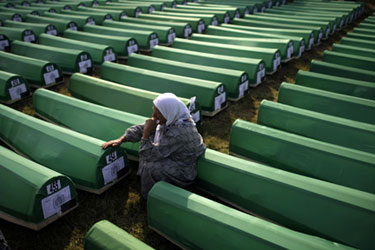The Mandate and Role of the Office
Methodology

A Bosnian Muslim woman mourns at the Srebrenica-Potocari Memorial
and Cemetery for the Victims of the 1995 Genocide, Bosnia and
Herzegovina. (July 2010, AP Photo / Marko Drobnjakovic)
The Office on Genocide Prevention and the Responsibility to Protect works to strengthen the role of the United Nations in preventing genocide, war crimes, ethnic cleansing and crimes against humanity by collecting and assessing information on situations of concern, advocating for appropriate preventive action, and raising awareness of the causes and dynamics of genocide and related crimes and possible courses of action.
Information collection and assessment
The Office collects information, primarily from UN sources, on massive and serious violations of human rights and international humanitarian law that, if not prevented or halted, might lead to atrocity crimes, by which we are referring to genocide, war crimes, ethnic cleansing and crimes against humanity. In close consultation with the UN system, the Office monitors situations of concern based on the Office’s Framework of Analysis for Atrocity Crimes. The Framework is a tool developed by the Office on Genocide Prevention and the Responsibility to Protect to assess the risk of genocide, war crimes and crimes against humanity. This tool replaces the previous Framework of Analysis, which focused only on assessment of the risk of the crime of genocide. The new framework is the result of extensive research and consultations within and outside the UN system and has been endorsed by the UN Secretary-General.
The Framework contains a list of 14 risk factors for atrocity crimes and indicators for each of the risk factors. The following risk factors have been identified:
Common risk factors:
- Situation of armed conflict or other forms of instability
- Record of serious violations of international human
rights and humanitarian law - Weakness of State structures
- Motives or incentives
- Capacity to commit atrocity crimes
- Absence of mitigating factors
- Enabling circumstances or preparatory action
- Triggering factors
Risk factors specific to each international crime:
For genocide:
- Intergroup tensions or patterns of discrimination against protected groups
- Signs of an intent to destroy in whole or in part a protected group
For crimes against humanity:
- Signs of a widespread or systematic attack against any civilian population
- Signs of a plan or policy to attack any civilian population
For war crimes:
- Serious threats to those protected under IHL
- Serious threats to humanitarian or peacekeeping operations

Secretary-General Ban visits Auschwitz-Birkenau, Poland
UN Photo/Evan Schneider
Early warning
When there is cause for concern, the Office acts as a mechanism of early warning to the Security Council, through the Secretary-General, by bringing these situations to its attention. Specifically, the Office provides timely advice to the Secretary-General on preventive action and mobilizes the UN system and other key partners, taking into account the urgency of a situation, and conducts advocacy missions to countries where the involvement of the Special Advisers is considered of particular value.
The early warning work of the Office fulfills a critical role within the UN system as it is the only organ specifically mandated to consolidate and analyze information on situations where there is a risk of genocide, war crimes, ethnic cleansing or crimes against humanity.
Outreach
The Office creates knowledge and raises awareness of the prevention of genocide, war crimes, ethnic cleansing and crimes against humanity in order to enhance the capacity of the United Nations to analyse and manage information relevant to genocide and related crimes, and enable States, the United Nations system and civil society to work collectively towards preventing genocide, war crimes, ethnic cleansing and crimes against humanity. The Office assists regional organizations and governments to institute prevention mechanisms for genocide and related crimes, and engages governments on the nature of genocide and constructive ways of managing diversity as a preventive strategy. Finally, the Office conducts training seminars for government officials, civil society and UN staff on the prevention of genocide, war crimes, ethnic cleansing and crimes against humanity.
